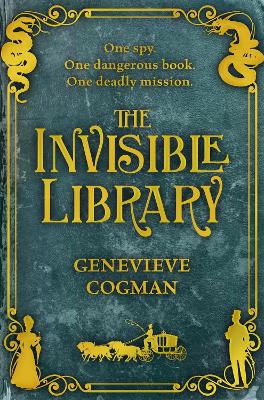
One spy. One dangerous book. One deadly mission. Discover the first book in this gripping fantasy mystery series – The Invisible Library is the astounding debut from bestselling author Genevieve Cogman.
Perfect for fans of Mr Penumbra's 24-Hour Bookstore by Robin Sloan, Jasper Fforde's The Eyre Affair or Ben Aaronovitch's Rivers of London.
'I absolutely loved this' – N.K. Jemisin, author of The Fifth Season
Irene is a professional spy for the mysterious Library, whose staff are sent to different realities to harvest dangerous and mystical fiction.
Irene has been posted to an alternative steampunk London along with her enigmatic new assistant, Kai. Their mission: to retrieve a dangerous edition of Grimms' Fairy Tales. But it has already been stolen.
In London's underground, the laws of nature have been bent – supernatural creatures and unpredictable magic stalk the land. The city is home to vampires, werewolves – factions that are all prepared to fight to the death for this book.
Irene must face a web of deadly danger, deception and secret societies. Her new assistant is hiding secrets of his own. Yet failure is not an option – the nature of reality itself is at stake . . .
Continue the journey with the adventurous second title in the Invisible Library series, The Masked City.
Praise for the series:
'I absolutely loved this' – N. K. Jemisin, author of The Fifth Season
'Irene is a great heroine: fiery, resourceful and no one's fool' – The Guardian
'Cogman keeps upping the ante on this delightful series!' – Charles Stross, author of the Merchant Princes series
- ISBN10 1447256247
- ISBN13 9781447256243
- Publish Date 15 December 2014
- Publish Status Active
- Publish Country GB
- Publisher Pan Macmillan
- Imprint Pan Books
- Format eBook (EPUB)
- Pages 400
- Language English
Reviews


Briana @ Pages Unbound
There’s something about a book about books that is irresistibly alluring to readers, something that whispers confidingly I understand, we like the same things—but I have often found these types of books do not live up to their promises. Fortunately, The Invisible Library steers clear of the trap of making excessive allusions to famous works of literature or quoting them slyly. Unlike so many other books about books, it does not attempt to prove its literary merit by dragging in references to classics kicking and screaming; instead, it celebrates books in the general sense—the stories, the knowledge, the power, the smell, and the comfort. And it pays homage to the Victorian detective novel by placing protagonist Irene into her own modern version of penny dreadful.
Irene has always had a secret yearning to meet a Great Detective, maybe even be one, and she gets her big chance when she is sent to retrieve a book from an alternate London where zeppelins fill the skies but vampires, werewolves, and Fae roam the streets. What should have been a relatively in and out job of stealing a unique copy of Grimms’ fairy tales quickly gets complicated when someone else steals the book first—and at leave three other groups are trying to hunt it down. Irene must decide whom to trust, and how much she really owes the Library, before she is killed—or, worse, corrupted by chaotic magic.
The Invisible Library is, simply put, a lot of fun. Irene and her mysterious, swoony trainee Kai get into a ton of scrapes while searching for their book, facing down magical creatures, a nosy colleague, and the Library’s most legendary enemy. And most of it goes down in a richly imagined magical, but distinctly Victorian, London.
There are moments where the pacing of the book is slow. Important conversations will be interrupted by passages of mental musings. Characters will hold long conversations when they are supposedly short on time and something dramatic should be happening any second. And despite the fact that Irene and her compatriots really are intelligent, there are times they just are not as clever as they think and take a long while to state the obvious. Even worse, other people will then praise them for it. (“Well, someone saw the subject at 11:00 pm and he was dead by 1:00 am, so he must have been murdered between 11:00 and 1:00!” “Why, yes! How clever of you!”) Though noticeable, these interruptions are not really a deal breaker for the novel, which generally does have a lot of action—and character development—going on.
Though Irene can be amusingly literal and detail-oriented (How does one gracefully remove one’s hand from a handhold???), the tone of the novel tends to be either serious or dryly humorous. This does not match my own sense of humor, but it did not bother me the way some mismatches in humor do.
Overall, The Invisible Library is a thoughtful, delightful read. Though the book is slated to be part of a trilogy, it stands just well enough on its own. I still have many open questions about the world, including the Grimm books Irene was seeking (even after the big reveal of its contents). However, I'm not yet certain whether I want to return for the sequels, or if I am satisfied having read as much as I have.
